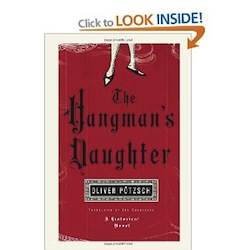 Published: 2010
Published: 2010
Author: Oliver Pötzsch, Lee Chadeayne (translator)
A well-researched historical crime thriller
One of the books I meant to read before the end of last year was Oliver Pötzsch’s The Hangman’s Daughter, but being me and having my butterfly like mind and appalling time management skills I didn’t get round to it until the last few days. Still, I’ve had books on my to be read list for 5 or 6 years so this wasn’t quite as bad as it could have been.
Inspired partly by the author’s ancestors, the Kuisl family of executioners, this is a fantastically well researched murder mystery set in 1659 Bavaria. Jakob Kuisl is the executioner for the town of Schongau and is responsible not only for administering the death penalty on transgressors but also for extracting confessions from those suspected of crimes.
The brutal murder of a young boy sees suspicion of the killing, and of witchcraft, fall on the local midwife Martha Stechlin. Kuisl is tasked with obtaining a confession from her through torture, however he is convinced of the woman’s innocence and decides to track down the real killer. With the assistance of his daughter Magdalena and town physician Simon Fronweiser, Kuisl investigates black magic, child disappearances and family secrets.
My main gripe with The Hangman’s Daughter was the fact that Magdalena wasn’t the main character. Or even the second most important character in the book. She was decidedly secondary to the plot – the daughter of the main character and the love interest to the hero’s sidekick. I’m not sure why the book is called The Hangman’s Daughter, perhaps to attract an audience who would be turned off by a novel with a torturer and executioner as its protagonist. It took me until about one third of the way through to stop expecting Magdalena to develop a larger role in the story. It was then that I started to enjoy it a lot more.
Some of the historical detail was fascinating – the strong belief that many held that midwives were witches came as a complete surprise to me, although thinking it through it perhaps shouldn’t have been so unexpected. A woman with the ability to help during childbirth and to help ease the pains of menstruation would naturally come under suspicion. Other details included the methods of torture that Kuisl used to extract the desired confession from suspects – painful just to read but beautifully written. Pötzsch is masterful at creating an evocative picture of the brutality of the justice system of the seventeenth century.
Jakob Kuisl is a great literary creation – a hangman who will carry out inhumane acts of torture, hating every minute of his work but reasoning that if he doesn’t do it someone else will. Kuisl collects textbooks and is probably the most learned man in all of Schongau, even though he has to live on the outskirts of town and is viewed with suspicion and distrust by his neighbours. Fronweiser too is enjoyable to get to know, a medical man ahead of his time who spurns the use of leeches and wants to understand more about the inner workings of the human body. If Pötzsch wanted to continue the stories of Schongau he has the makings of great detective double-act with Kuisl and Fronweiser.
The book is perhaps a little overlong and it sags slightly in the middle. It is, however, still a very good crime thriller with a unique hero (if not heroine) and could open the door to a new series of historical mysteries if Pötzsch were interested in going down that route.

